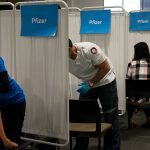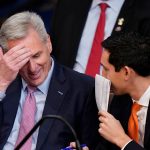Daylight saving time could become permanent in the US if a Florida senator gets his way.
Marco Rubio wants to get rid of what he calls the “antiquated practice” of changing the clocks twice a year.
He has reintroduced a bill called the Sunshine Protection Act, which passed the Senate last year with no opposition but stalled when it reached the House of Representatives
“This ritual of changing time twice a year is stupid,” he said in a statement.
“Locking the clock has overwhelming bipartisan and popular support. This congress, I hope that we can finally get this done.”
The bill would mean daylight saving time, which begins in March and ends in November in the US, would become permanent year-round.
Representative Vern Buchanan, who introduced companion legislation, said there were “enormous health and economic benefits to making daylight saving time permanent”.
Time to stop messing with the clocks?
“Florida lawmakers have already voted to make daylight saving time permanent in my home state and Congress should pass the Sunshine Protection Act to move Florida and the rest of the country to year-round daylight saving time,” he added.
Oklahoma senator James Lankford, a co-sponsor of the bill, said it was “past time to get this bill to the president’s desk so we can take the stress, headaches, and annoying twice-a-year reset of the clocks out of our lives”.
Minnesota senator Tina Smith said changing the clocks was a “pointless exercise that robs us of daylight hours during the darkest time of the year”.
The US first adopted daylight saving time in 1918 to save energy during the First World War, but it didn’t officially become law until 1966, under the Uniform Time Act.
The UK also brought in daylight savings during the war – 1916 was the first year of British Summer Time (BST).
BST was made permanent in 1968 in an experiment that lasted three years.
One of the main arguments for changing the clocks is that lighter mornings in winter mean fewer children are killed in traffic accidents on the way to school. During the experiment, the number of accidents went up considerably.






















